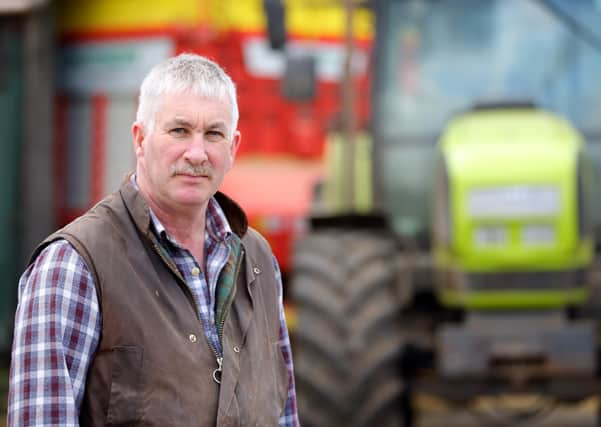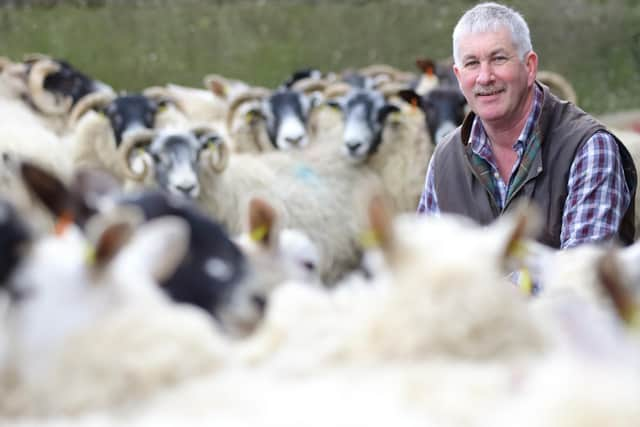UFU will take to the streets ifclimate legislation ‘goes south’


In a very forthcoming interview with Farming Life’s Richard Halleron, the North Antrim man said that he would not stand idly by and allow large swathes of Northern Ireland’s livestock industry to be decimated by what he regards as proposed legislation that is not grounded in scientific fact.
He added: “Don’t get me wrong, the farming industry fully recognises that it must respond in a very constructive manner to the challenge of climate change. But I won’t stand for the introduction of legislation that will destroy so many thousands of jobs in rural areas for no good reason.
Advertisement
Advertisement
“And this is what’s coming down the track if Clare Bailey’s bill is accepted in its current form.”


Input costs
Reflecting on the Union’s current policy priorities, Chestnutt confirmed that all farm input costs are rising at the present time. “I think this will re-focus the industry,” he further explained.
“Farmers will be encouraged to minimise their use of inputs as they look to the future. This will entail the greater use of soil testing, monitoring pH values and looking at the inclusion of clovers in grassland swards.
“On our own farm we are currently growing more grass than ever. This is down to making better use of slurries.
Advertisement
Advertisement
“We will all learn to do things differently moving forward. But this is happening against the recent uplift in farm gate prices.
“If it’s just a case of inflation kicking in across the board, then farmers should be in a position to take more off the farm than they are taking in.
“The current hike in input costs is concerning. But we all need to find smarter ways of working.” The Union president also believes consumers now recognise that they will have to pay more food into the future. He commented: “This is inevitable. I think we are coming into a period of stronger inflation. In the past this never did farmers much harm.
“Double digit interest rates would not be a pleasant prospect. But there seems to be a train of thought doing the rounds at the present time to the effect that interest rates will settle at around 5% per annum in the medium to long term.”
Grass is our ace card
Advertisement
Advertisement
Victor Chestnutt is quick to point to the grass-based production systems followed on local farms as holding the key, where the future sustainability of dairy beef and sheep sectors are concerned. He continued:“Our inputs are slightly less than those required by the feedlot operations that exist in other parts of the world.
“This should leave us more competitive as we look to the future. I am also a great believer in our family farm structure. It is one of the best systems, allowing food to be produced at less cost. But our farmers still need to have the opportunity of earning a sustainable income from their businesses.”
COP 26
The Union president confirmed that he will attend the upcoming COP 26 summit in Glasgow. In his opinion the event itself, and its aftermath, will ensure that climate change and sustainability will be the focus of discussion within the media and beyond for the next number of weeks and beyond.
While in Glasgow the UFU president will be meeting a wide range of industry and stakeholder leaders, representing every aspect of society
Advertisement
Advertisement
Chestnutt further commented:“Farmers realise that they must be more sustainable moving forward. They will have to do their jobs that little bit better. “But we won’t need to just export our problem and import our food. Northern Ireland is in a good place to produce lots of affordable and healthy food.
“But we have got to do this in a sustainable manner. And carbon is only part of the story: it’s also about biodiversity, water and air quality.”
He continued: “Farmers should take stock of the biodiversity levels within their farms. When I was growing up Irish hares were plentiful on the farm. Then they disappeared. But now, thankfully, they are starting to make an appearance again. “It’s nice to see that. We still hear the cuckoo every year. We used to have yellow hammers and I would like to see then coming back.
“Looking ahead we are planning to include a bit more arable within the business. The cereals grown will be consumed on the farm.
Advertisement
Advertisement
“I am very critical of the Department of Agriculture and the way that the subject of wild bird cover has been handled. Under the old Countryside Management Scheme, growing a few acres of wild bird cover was a feasible option.
“But this is not the case under the Environmental Farming Scheme, where monies are prioritised in the direction of activities that have a lasting impact on the farm rather than those having a single year benefit.
“Basically you can’t buy ground at up to £10,000/ac and subsequently sow wild bird cover on it without support.”
The rural landscape
The Union president is firmly of the view that Northern Ireland has a rural landscape to be proud of.
“But it’s not so good that it can’t be improved,” he said.
Advertisement
Advertisement
“There’s a lot of talk about tree planting at the minute. But the obvious starting point in this regard is for farmers to ensure there is a hedge around every field.
“Our fields are still too small. I still think there is a case for many smaller fields to be amalgamated into something a bit bigger. “If there is a hedge around every field, the opportunity to plant trees within these boundaries is obvious.” Chestnutt further explained:
“Farmers should start planting out shelter belts on those areas of the farm that are unproductive.
“Only when this has been achieved should the issue of planting trees on productive ground be considered.” But Victor Chestnutt believes passionately that farmers must get recognition for the trees that they plant and the hedges that they grow.
Advertisement
Advertisement
“At the minute within the national inventories all the benefits associated with this activity go directly to society,” he said.
“The carbon that is locked up by grass, trees and hedges must be allowed to offset the emissions produced by animals on farms. This is not the case at the moment.
“As a union, we will be pushing to have this issue re-visited as a matter of priority.
“At the minute, the carbon sequestered on my farm goes to benefit society as a whole. This is wholly unfair. Farmers must receive full and official recognition for the carbon that they are sequestering on the back of the management decisions they take within their businesses on a daily basis.”
Future farm support
Advertisement
Advertisement
The UFU president believes that society as a whole buys into the principle of supporting UK agriculture into the long term.
He explained:“As an industry we need long term support. But I also think that the support farmers need will always be there. “It may be drawn down differently. But if we are truly serious about climate change farmers are unique in being able to operate on both sides of the equation.
“Getting the money may well require farmers involving themselves in a number of different schemes. And I think this is only right and proper.”
Chestnutt continued: “The downside is that life looks set to become more complicated for farmers as they access the support that is available. But government also recognises that agriculture plays such an important role in maintaining environmental standards across the country as a whole.
Advertisement
Advertisement
“And, on that basis alone, it will have no option but to continue supporting the farming sectors. “Looking to the long term we need to see at least the same level of support coming into the industry, as is currently the case.
“Last year, the single payment accounted for 81% of the income generated on local farms. This situation is not going to change as we look to the future.”
According to Victor Chestnutt, government wants food to be produced in an environmentally sensitive manner. But he also recognises the vast improvements that farmers in Northern Ireland can secure as they strive to improve the efficiency of their businesses.
As far as he is concerned efficiency and sustainability are two sides of the one coin. The Union president supports the four pillars of sustainability, laid out in the policy framework document recently published by Northern Ireland’s farm minister Edwin Poots. These are: increased farm productivity; improved resilience; environmental sustainability and a responsive supply chain.
Advertisement
Advertisement
He commented: “The public consultation that is now ongoing needs to be very sharp and to the point.
“In total contrast to the developments that have taken place in England and Wales, the Union here has worked very closely with the farm minister and his officials to put in place a policy document that meets the specific needs of local farmers.
Food security Victor Chestnutt is taking it as read that food production levels will, at the very least, be maintained in Northern Ireland.
He explained: “I don’t buy into the principle that we need to throttle back our food production levels with the world’s population set to increase so significantly over the coming years.
Advertisement
Advertisement
“The more we import food, the greater the intensity of the carbon within the food that we eat here. This approach makes no sense at all. Western Europe can produce redmeat and milk with a carbon intensity figure that is 52% less than that recorded in the rest of the world.
“So importing food puts the carbon intensity figure entirely in the wrong direction.
Bovine TB (bTB)
The Union president has received a commitment from the Department of Agriculture, Environment and Rural Affairs (DAERA) that real progress will be made on the issue of bTB eradication before he leaves office next spring. And, as far as he is concerned, this must mean addressing the significant reservoir of disease within Northern Ireland’s wildlife populations.
He commented:“Unfortunately, wildlife intervention has to be part of the strategy moving forward. And I have absolutely no dislike for badgers, whatsoever.
Advertisement
Advertisement
“I have just returned from a three-day trip to England where I had the opportunity of assessing the badger cull taking place there at the present time.
“The work is extremely well managed. And it is having the desired effects. Farmers are reporting significantly lower levels of bTB breakdowns.
“The other thing that impressed me was the fact that farmers on whose land a cull was carried out are reporting that other forms of wildlife are making a re-appearance. These include hedgehogs, brown hares and ground nesting birds.”
The Northern Ireland Protocol
Victor Chestnutt is confident of a breakthrough being achieved in the ongoing negotiations with regard to the implementation of the Northern Ireland Protocol.
Advertisement
Advertisement
He commented:“I am pretty certain that this breakthrough will take place within weeks.
“The Union has always campaigned for trading relationships within the UK that make practical sense.” But the Union president also believes that these measures can be achieved while still allowing Northern Ireland free access to the rest of the EU.”
He concluded: “It’s all about common sense being brought to bear on the matter. But I see no reason why Northern Ireland cannot ride both horses when it comes to trading with the rest of the UK and the EU.”